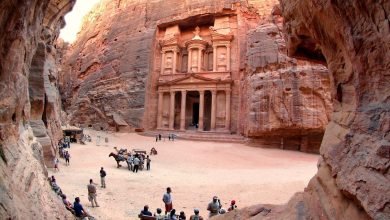
Jordan Daily – Jordan’s tourism sector, which contributes 15% directly to the national economy and supports a wide range of other industries, is facing structural challenges that must be addressed to sustain growth, Senator Michael Nazzal told a joint meeting of the Amman Cosmopolitan and Amman Philadelphia Rotary Clubs on Wednesday.
Speaking at the Four Seasons Hotel, Nazzal, who chairs the Senate’s Tourism and Heritage Committee and hails from a family with five generations in the hospitality business, outlined the economic ripple effects of tourism, from hotels and restaurants to handicraft producers, airlines, and transport companies.
“Tourism is not just about filling hotels,” he said. “It’s about the many industries that depend on those hotels.” He cited examples from countries such as Spain, Turkey, Egypt, and the UAE, where tourism growth has driven broader economic development.
Nazzal recounted his family’s contributions to the sector, from operating the Philadelphia Hotel in downtown Amman in the 1920s to pioneering hotels in Petra, Aqaba, the Dead Sea, and Ma’in, as well as founding Royal Jordanian Airlines and bus companies.
Jordan’s best pre-pandemic year was 2019, but recovery has been uneven. The country welcomed six million visitors in 2023, yet only 1.1 million went to Petra, a gap that, he argued, shows the need to distinguish between true tourists and other visitors such as expatriates, business travelers, Palestinians crossing from the West Bank, and transit passengers. He said inflated figures can mask the reality: “If only 250,000 people visited Petra, we only had 250,000 tourists.”

Nazzal stressed that reducing seasonality is critical to improving occupancy rates, increasing average room rates, and making hotel investment attractive. He noted that the Zara Company, a major Jordanian hospitality firm, has not paid dividends to shareholders in 25 years, and that high operating costs make even top-tier hotels struggle to achieve returns. Jordan’s overall hotel occupancy averaged 55% in 2023, far below what is needed for profitability. The sector aims to create 100,000 new jobs over the next decade, requiring an additional 30,000 hotel rooms, but investors are reluctant without better returns. “Investors will only come when they see a return,” Nazzal said, pointing to the need for strategies such as promoting off-season travel and securing more airline capacity.
Highlighting the country’s rich religious heritage, Nazzal lamented that the Baptism Site of Jesus receives only about 100,000 visitors annually, compared to 26 million who visit the Vatican. “Jesus himself was here, along with the apostles,” he said. “Yet we get a fraction of the visitors.” He urged development of the site and surrounding areas, along with other Christian and Islamic landmarks, to draw more faith-based travelers.
Air connectivity remains a bottleneck. Many low-cost carriers withdrew during recent geopolitical tensions, and replacing their flights is not as simple as “pushing a button,” Nazzal said, due to scheduling and aircraft allocation constraints. Royal Jordanian Airlines, he added, is focused on high-demand routes for expatriates and regional travelers, leaving limited capacity for long-haul leisure tourists from Europe and North America — markets where Jordan already has marketing infrastructure in place.

Nazzal also called for better ground transport to connect key sites such as Amman, Petra, Madaba, and Aqaba, noting the absence of a reliable public system for tourists. The lack of large-scale conference and exhibition facilities, he argued, is another barrier to attracting high-spending visitors and filling five- and seven-star hotels.
The senator said the tourism industry has taken on roles that should be handled by the government, from marketing through the Jordan Tourism Board to training via hotel schools. “The only sector that is subsidizing its own training and marketing is tourism,” he noted. However, he expressed cautious optimism that with the right leadership and an end to the Gaza war, the sector could rebound to 2023 record levels.
Nazzal criticized the frequent turnover of tourism ministers, 36 in recent decades, most serving less than a year, which has hindered policy continuity. He urged a more analytical approach from the Ministry of Tourism, including detailed visitor behavior studies to lengthen stays and fill seasonal gaps.
In response to questions, Nazzal rejected the notion that hotel rates are excessively high for Jordanians, pointing to budget options in Aqaba and the Dead Sea, but acknowledged that high taxes, electricity costs, and labor expenses drive prices up. On medical tourism, once a Jordanian strength, he said poor service attitudes among some doctors have tarnished the country’s reputation, leading Gulf patients to seek treatment in Asia. He also endorsed creating affordable cultural evening events, dinner shows, traditional dance, and music, to give tourists more to do after dark and showcase Jordan’s heritage.
While Jordan’s tourism sector has the assets, infrastructure, and experience to grow, Nazzal warned that without addressing seasonality, airlift, transport, and product development, the country risks missing opportunities. “Tourism is linked to everything, transport, airlines, marketing, services,” he said. “We can’t just say we want more tourists. We have to create the conditions for them to come, stay longer, and spend more.”

